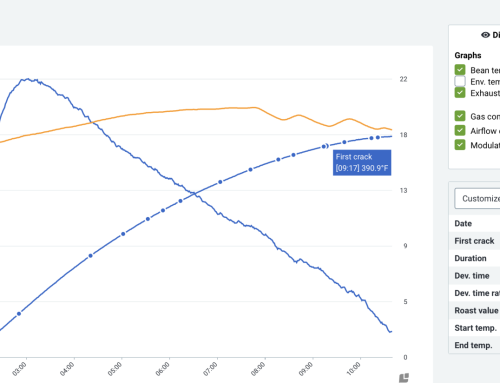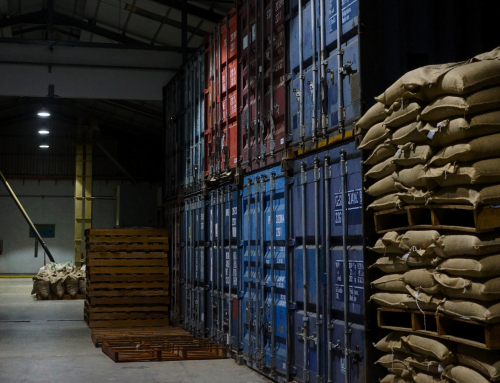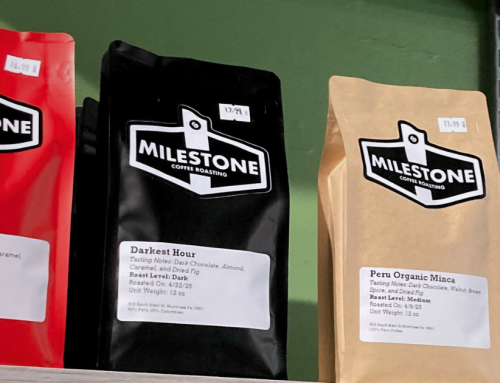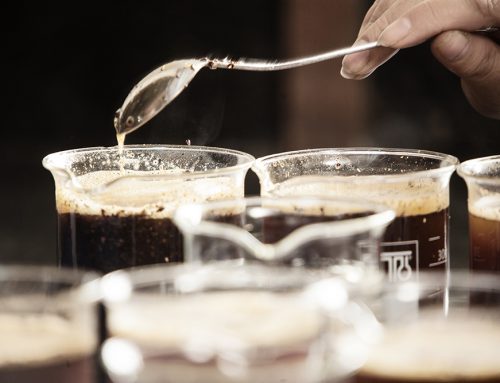We were all super-excited to arrive in Portland for EXPO this past April. Right after check-in, we went straight to the conference center to build out our booth. Every exhibitor was busily constructing their booth in anticipation of the deluge of coffee lovers that were about to descend on Portland. We were thrilled because our program of roasters and speakers looked amazing. We booked several roasters to brew coffee at our booth and ordered a standalone bar to be shipped direct to the booth. When we unpacked it, the bar turned out to be a rocking chair – thanks, Wayfair. Rather than pound the sand, we headed to IKEA – we figured a white “bar” made with an Allen wrench was better than nothing.
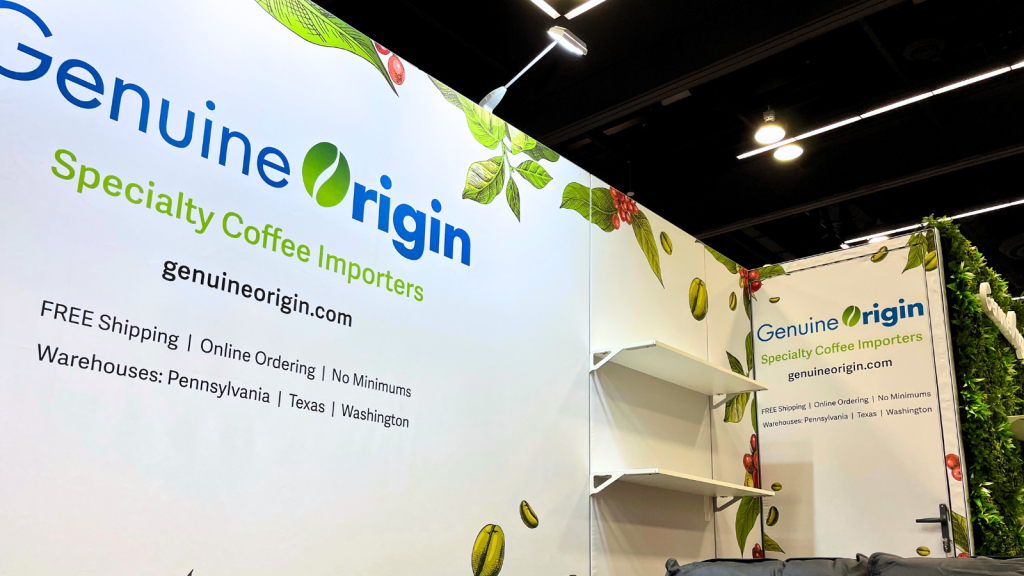
Genuine Origin Coffee EXPO Booth 2023 set up
The Volcafe Specialty Coffee team (our full-container-selling sister co) and the GO team met up at Hey Love, one of Portland’s posh, downtown bars. We laughed about the rocking chair and prayed that we got the worst of the show out of the way.
The next morning, the SCA board kept the crowd waiting until 10:10 AM (10 minutes more than they wanted). Pretty gutsy move considering they were standing in the way of a crowd and a boat-load of free coffee.
We attended the lecture by Ken Davids of Coffee Review. Ken discussed the evolution of specialty coffee over the last 50 years. First, don’t grind until you’re ready to brew – we never thought about it, but someone had to start telling people that was the right way. He wrote books on coffee.
Ken saw and tasted the potential in coffee and, when it was far from being considered one, wanted to elevate coffee and market it like a specialty beverage that could be valued for its attributes, like wine. When he first started writing, people at the vanguard of coffee talked about differentiation by origin and roast profile. Today, that has evolved into differentiation by process, variety and producer.
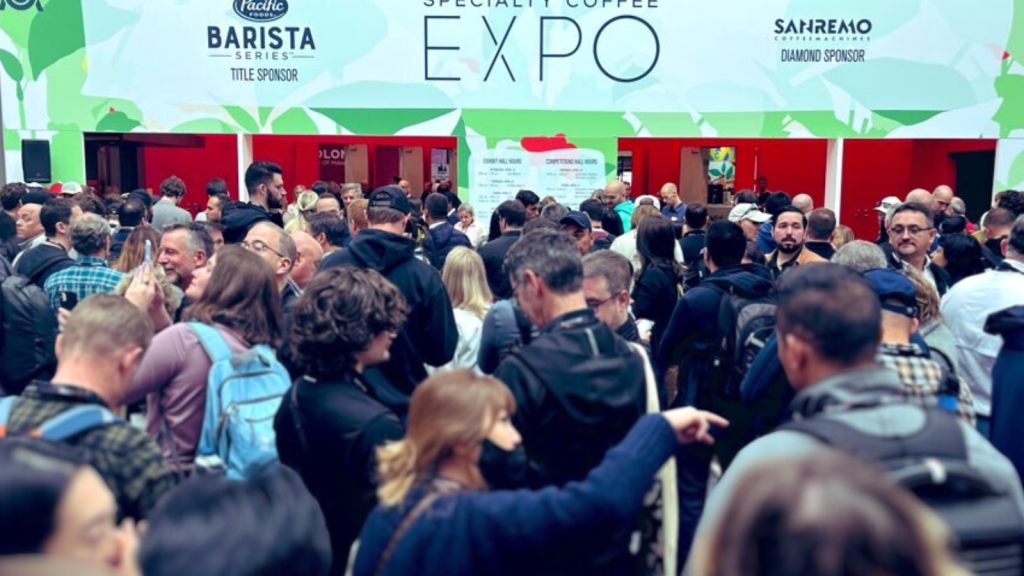
Opening day at EXPO 2023 Portland, OR
Ken also posed some interesting questions: will the energy and excitement in specialty coffee be corporatized? Are producers driving product differentiation? We asked, will we soon have rock/rap star coffee producers and where will coffee be in another 50 years? Ken’s answer, “you tell me!”
During the lecture, it turned out we were sitting close to Palace Coffee from Amarillo, Texas. We headed over to their Roaster Village booth for a PNG Lahamenegu Natural espresso. Amazing fruit-forward cherry notes on that one!
At the booth, Cerberus coffee brewed up Finca Las Moras and Capili Peaberry. Arnold from our Honduras operation and Roberto from our Peru operation were on hand to sample the brew in a meta-coffee moment: the people who originally sourced these coffees were sampling the coffee they originally sourced.
Talking with Maria Renee Morales, GM of Volcafe Guatemala. She recapped the humble beginnings of the La Morena program and why there was a need. She told us that most women farmers come to own coffee farms through inheritance and know little about coffee farming when they are willed the farm by a husband or parent. Additionally, many women are not taught Spanish in many indigenous communities, so buying coffee from them takes finding a translator. Finally, gender stereotyping continues to be a hurdle for women coffee farmers. Maria told the story of a woman who sold her coffee to an intermediary. When she did not get paid in a timely manner, the woman confronted the intermediary who told her that she did not need the money for her coffee, “Let your husband provide for you.”
Buying coffee from women was not that straight forward, but Maria was undaunted by the challenges. She found agronomists that could speak the local dialects. She gave women technical and agronomic support to develop best-practices in farming and to manage the business end of their farms better. Fast forward seven years: what started out as a 2000 lbs micro-lot from four women has ballooned into a program that sources more than 160,000 lbs of coffee per year from over 800 women producers.
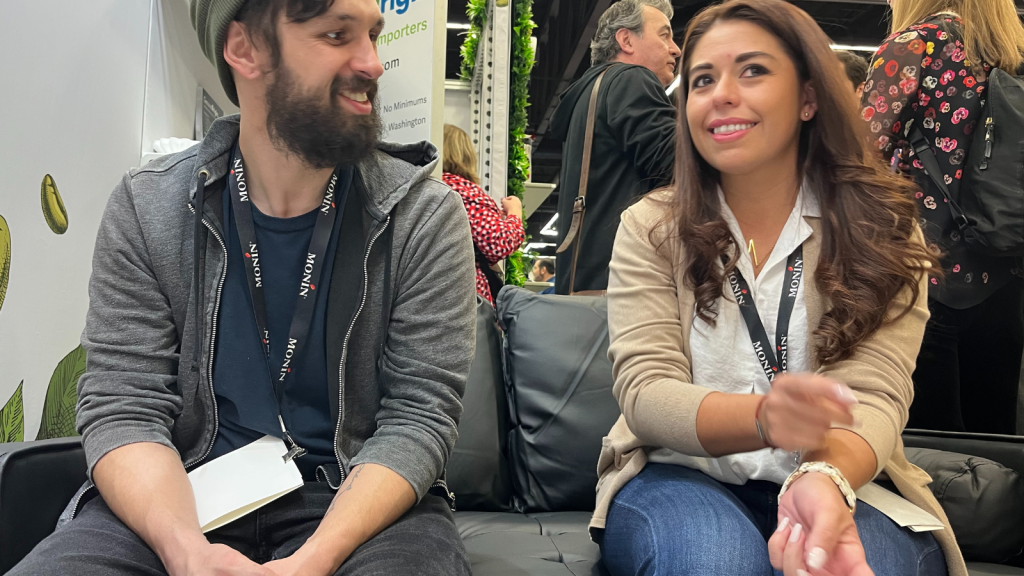
Maria Morales, GM of Volcafe Guatemala
The cinnamon notes from Finca Betulia Honey by Push X Pull blew us away. Another meta-coffee moment as Sebastian from our Colombia operation was on hand for the brewing.
Frank Reese, General Manager of Molinos de Honduras, our sister company in Honduras, detailed how Molinos completely disrupted their supply chain and went direct to producers. In Honduras, with so many smallholders with less than one hectare under coffee, exporters typically buy coffees through intermediaries. About 85% of all coffee purchased from Honduras is bought through intermediaries. And why not? It’s faster and easier. However, this limits traceability, makes it difficult to reward quality production, and gives exporters less control over their product. Frank and his team decided to change all that.
It took several years, but Molinos now sources about 90% of its coffee directly from farmers. The farmers are happy because they are getting paid more for their crops and Frank’s team – everyone from the cupping lab to the warehouse to accounting department – has to work really hard to keep up with tasting coffees, separating and storing them and paying people directly. Frank is happy with the trade off and has no plans to turn back. From the GO perspective: our Hondurans are some of the finest, most solid coffees in our catalog.
Amanda Miller of Studio coffee roasters brewed up a Chemex of Organic Washed Yirgacheffe. She chose this one because of its delicate, tea-like body. Notes if jasmine, green tea, melon and bergamot bloomed in the cup. She told us that at Studio, people where many hats. She roasts, works as a barista and more. Everyone has to do everything at Studio.
Friday night, we had dinner with all of the people from our sister companies across the globe who flew in for the show. Twenty-five of us headed to Kann on Ash Street. Usually it takes about three months to get a reservation, but Ian from Deadstock was able to hook us up. Saying the dinner was mind-blowing would be an understatement. Most of our party left saying it was one of the best (if not the best!) meal they had ever eaten.
On Saturday we attended a Robusta panel discussion. The panelists were an awesome mix of importers, exporters, scientists and farmers. Apparently, harvesting robusta coffee cherries is improving and anaerobic processing is improving quality (this echoed a detail from Ken Davids’s comment about anaerobic process robusta being quite pleasing). The presentation discussed numerous ideas: Is robusta the future of coffee? Is the market shifting? Does robusta just need better marketing. Importers said that blind cuppings looked good for robusta (Will we be selling specialty robusta in the near future?). Farmers said that ripe red cherries and post harvest processing is critical. Some other key points to remember: other countries outside of US drink much more robusta. It’s generally used as an ingredient in espresso and Arabica has been marketed heavily to the US market. The challenge will be to develop robusta as its own profile. Sadly, the scientist in the group said that Robusta is not a silver bullet for climate change and coffee.
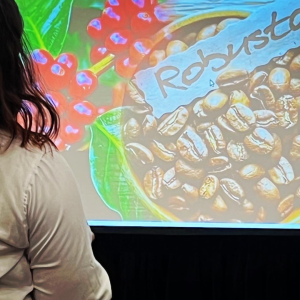
Marketing Robusta lecture at EXPO
The volumes are not there for mass specialty robusta yet, but there was definitely enough to fill several brewers in the back of the room. A couple of those coffees definitely made us rethink robusta.
Caleb from Ramshead brewed up some of our finest coffees – seems like he’s well connected. Tea like and floral geshas.
At Coffee Champs, Brewers Cup contestants called recognized the estates, the soil, varietals, the fermentation, even the age of the trees before in some cases. Yudi, from Reborn poured a Yemeni coffee for the judges and imparted, “Love is what takes us to different dimensions.” The Latte Art competition was almost too tense to watch. Drawing the head of a horse, a ram, a coffee bean, etc. with steamed milk! Kudos to Andrew Coe of Elevator Coffee Co for winning the 2023 US Coffee Roasting Championship.
Sebastian Pinzon, General Manager of Carcafe in Colombia talked sustainability with us. He told us that keeping coffee sustainable goes beyond climate and agronomic advice for farmers. It’s about educating producers. It’s about making farms viable businesses. Farmers need to be profitable in order to grow coffee. If not, they will move on to other crops or, in some cases, may abandon their farms all together. Sebastian has scores of agronomists on his team that help farmers with best practices, but who also show the farmers how to become more profitable. There is no charge or obligation for the farmer for this service.
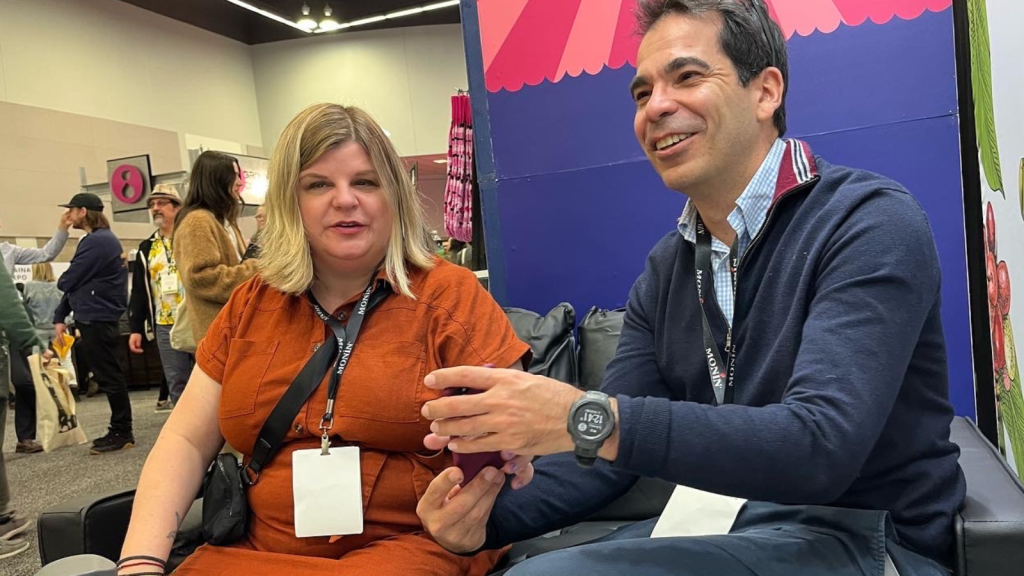
Sebastian Pinzon, GM of Carcafe, with Cyndi from the GO Team
Zipporuh (Zippy) Irungu, the General Manager of Taylor Winch Tanzania – our sister co, told us about her gender equity program. We expected to hear about new women lots, similar to Maria’s amazing story about La Morena. Instead, Zippy’s program is challenging social norms and trying to help women have their voices heard. She is working with cooperatives and farmers to demonstrate the power of letting women run farms and have Board seats on coops. The gender equity program is starting to make progress. Women are starting to be given a small number of coffee trees to manage and forward thinking cooperatives are allowing women to serve on their Boards in leadership positions.
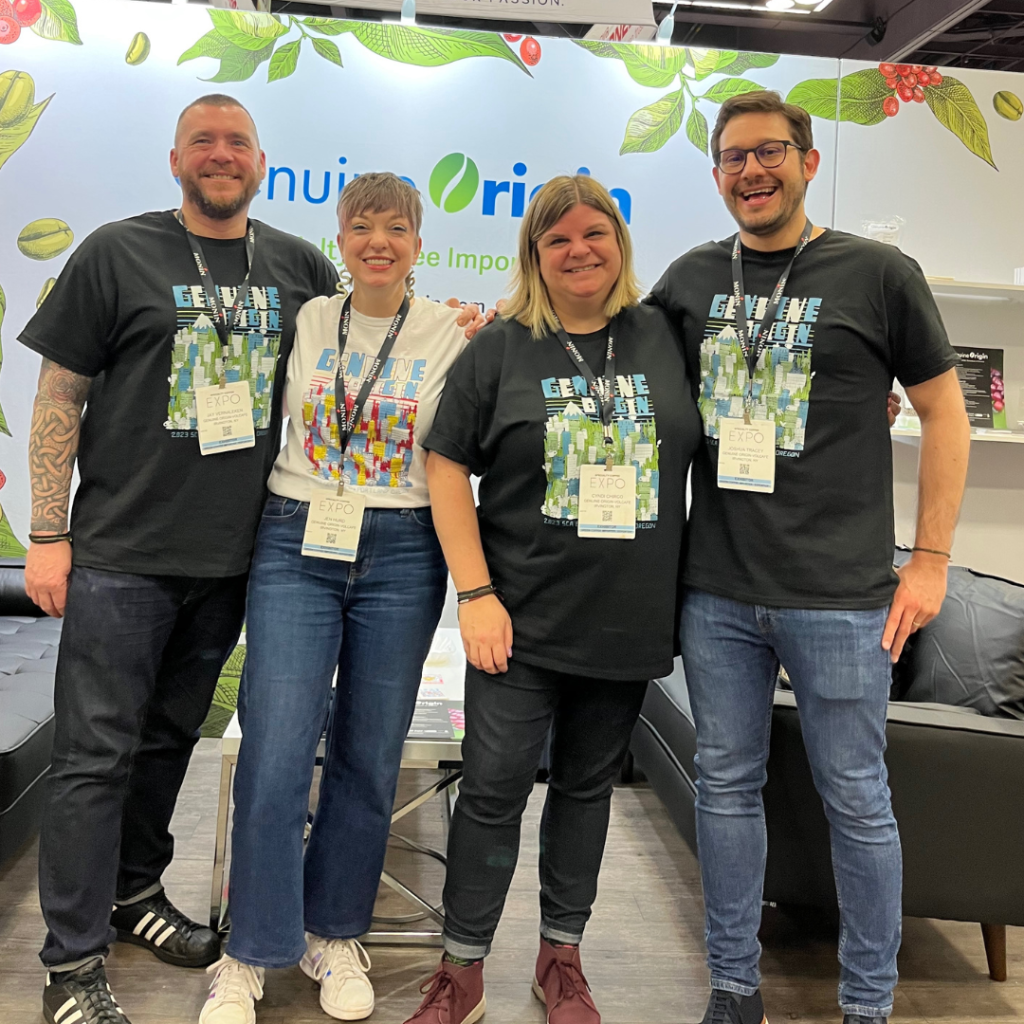
The GO Team wearing GO tshirts
This Coffee Life brewed Colombia micros. Ladder Coffee Roasters brewed Guji Mormora Farm Natural & Costa Rica Jaguar Anaerobic Honey – perfect because Max & Rafa from our team at San Diego Mill were on hand to sample it.
Archive Coffee Roasters and JBC were at the booth on Sunday helping us make the magic happen with brewing excellence, but our team was a little fried by the end of the day. After years of false starts and missed conventions due to COVID, Portland EXPO was proof positive that the coffee is back. We were wiped out, but exhilarated looking forward to Chicago EXPO 2024.

